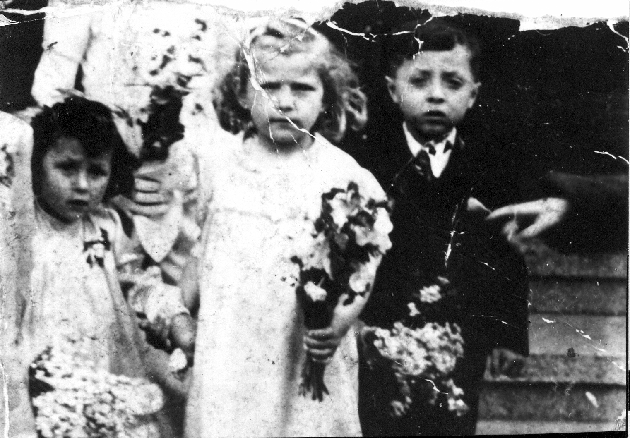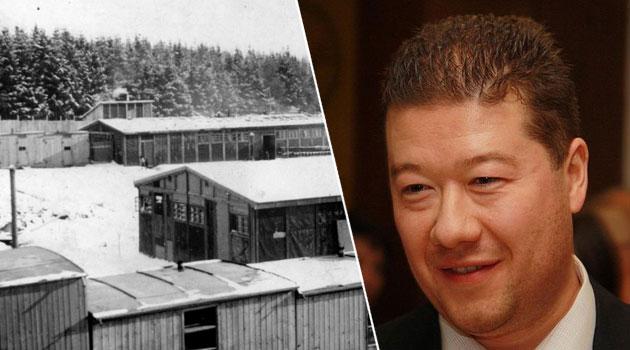Czech organization remembers the Nazi genocide and aids its Romani victims

We were invited to visit a Ms M. F. so we could interview her and then tell her story. She did not want her full name to be publicized, so we are respecting her wishes and referring to her by her initials only.
We found Ms. M. F., who was born in 1943, waiting for us in front of a prefabricated apartment building on a housing estate in Prague. It is her birthday.
The timing of our visit on that day was accidental. I was accompanied to the interview by a representative of a foundation in Germany, Mr Stephan Müller.
Ms. M. F. brought us into her two-room apartment, where she lives alone. Our first impression of it is pleasant – the walls are white, it is full of light and carefully maintained.
The living room is decorated with porcelain figurines and paintings from Ms. M. F.’s brother, who is an antiques dealer, as well as family photographs. She tells us how her mother was pregnant with her when her mother, her two older sisters, her father and her uncle were all imprisoned in the concentration camp at Lety.
Ms. M. F. and her family were among several individuals who were released from the “Gypsy Camp” at Lety prior to its closure. Apparently, Ms. M.F.’s grandmother managed to achieve their release, something that Ms. M. F. cannot explain, but assumes that she must have bribed the guards.
It was Ms. M. F. who had yet to be born when the family was released from Lety. She was fortunate, because none of the children born in that camp survived the conditions there.
After their release, the family went into hiding until the end of the war and lived in fear of those around them. Even though they had been officially released, they were afraid their neighbors would turn them in and the entire process would start all over again.
That fear lasted for some time after the war ended, when the neighbors’ children were not allowed to play with Ms. M. F. and her siblings. Her mother died during the 1950s and her father emigrated, abandoning his seven children and beginning a new life with a new family abroad.
Ms. M. F.’s grandmother did an exemplary job of caring for the children left behind. Both Ms. M. F. and her siblings, however, have had lifelong health repercussions from this difficult life.
In Ms. M. F.’s case, her lungs are weak, she suffers from frequent pneumonia, and she also suffers from great back pain. She graduated from primary school, after which she stayed home to aid her grandmother with caring for her younger siblings, and then did her best to emancipate herself from that situation by marrying early.
Why did this all happen?
Ms. M. F. moved into that very apartment at some point during the 1970s, and soon after moving in she found the image of a coffin, inscribed with the word “Gypsies” (Cikáni), carved into her door. At the time she was performing manual labor in a warehouse, where she eventually worked at the reception desk just before retirement.
She also cared for her grandmother during her final years of life. Given her own accumulated health problems, Ms M. F.’s doctor declared her eligible for disability, as she was unable to either sit or stand for hours at work.
Prior to her retirement Ms. M. F. had ended up on unemployment and had to endure Labor Office staff disrespectfully telling her that they couldn’t find her a job because she didn’t know how to do anything. Currently she is drawing a minimal pension as well as welfare benefits – aid to those in material distress – to cover the costs of her food and rent.
She is very anxious to save money on energy and water. Unfortunately, when she sets money aside that way, her housing benefit is reduced for the next three months by that amount.
Saving money, therefore, is no way to improve her material situation. Her days are full of doctors’ visits and caring for her family’s graves.
She perceives her tedious visits once a month to the Labor Office most painfully, as she apparently must collect her welfare vouchers in person there. Now, at the end of her life, she feels as if she is reliving her postwar days.
Ms. M. F. says she feels like a beggar being given meal tickets. After the war what was disbursed were ration tickets, so for her not much has changed.
She misses her extended family. She and one sister, who is no longer able to travel, telephone each other sometimes, and she meets one brother at the cemetery, but their other siblings are no longer alive.
Her grandchildren and her son do sometimes come to visit. From her small pension, though, she cannot afford to host them properly.
Today she only eats chicken, making a single bird into food for three days – two chicken breasts for schnitzel, the rest for paprika chicken and baked wings. Her extended family’s solidarity and visits from friends ended when her grandmother died and the older generation began to disappear.
When she sees films about the Second World War on television, she cannot stop thinking about why that all happened and why people judge each other according to skin color. After she passes away she wants to be cremated, as she does not want her children to be burdened with maintaining her grave.
Ms. M. F. told us we were the first people to treat her nicely. We hope that will change soon.
Latscho Diwes
Ms. M. F. has become a participant in a program focused on improving the health and social situations of the Romani survivors of Nazism throughout Central, Eastern, and Southern Europe organized by the Erinnerung, Verantwortung und Zukunft (Remembrance, Responsibility and Future – EVZ) Foundation established by the Federal Republic of Germany. The program is called Latscho Diwes, a Romanes-language greeting as transcribed in German.
In the Czech Republic, thanks to the EVZ, the organization Živá paměť (Living Memory) aids the victims of Nazism. Thanks to its many years of experience providing direct assistance, the organization has been helping about 200 Romani survivors of Nazism, beginning in January of this year and lasting through November 2019.
For the time being more than 130 authorized applicants have contacted the organization, Romani people born before 8 May 1945. The oldest persons among them were born in 1928.
A financial contribution is made to them so they can cover their expenditures for medical equipment such as hearing aids, bifocals, walkers, orthotics or medicines and nutritional supplements (worth CZK 2 800 – EUR 109 total). Survivors and their relatives are also able to take advantage of the services provided by the expert social advice bureau of the “Counseling Center for Victims of Nazism”.
Counseling center and genocide commemoration
The counseling center offers the Romani victims of Nazi persecution during the Second World War expert social counseling and support with acquiring Certificate No. 255/1946, Coll., issued by the Czech Defense Ministry to those who either fought with the resistance or were imprisoned by the Nazis. Persons holding such a certificate are entitled to a pension contribution and to free care services, as well as to aid with drawing on those services and assistance with claiming their entitlement to a one-time payment from the German state’s support system for Romani survivors of the Holocaust who were imprisoned in the “Gypsy Camps” on the territory of the Protectorate of Bohemia and Moravia (Lety u Písku, Hodonín u Kunštátu) and the Slovak State (Dubnica nad Váhom).
The Lačho ďives! project, as the Living Memory organization has translated the EVZ program, will also be involved with commemorations in the Czech Republic of the Holocaust of the Roma during the Second World War and with making the life stories of the Romani survivors more visible. This autumn, students at art colleges will be able to contribute their work to a competition on this subject.
The students will meet with Romani Holocaust survivors or their descendants. The winning artwork will be exhibited next May in Prague at a ceremony attended by dignitaries as well as the Romani survivors of Nazism themselves and their descendants.
The organization was established 15 years ago by staffers at the Czech-German Fund for the Future’s Office for the Victims of Nazism, which disbursed payments from the EVZ Foundation in the Czech Republic to those who had been subjected to forced and slave labor. Currently the organization is also cultivating the common legacy of those persecuted by totalitarian regimes and is pursuing documentary, educational and informational work relevant to that subject matter.
First published in Romano voďi magazine (www.romanovodi.cz), which is partially funded by the Czech Culture Ministry. The thematic issue in which this article appeared was partially funded by the EVZ Foundation.
